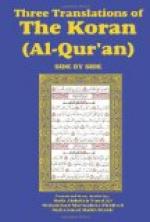The Arabic text from which this translation has been made is that of Fluegel. Leips. 1841. The translations of Sale, Ullmann, Wahl, Hammer von Purgstall in the Fundgruben des Orients, and M. Kasimirski, have been collated throughout; and above all, the great work of Father Maracci, to whose accuracy and research search Sale’s work mainly owes its merits. Sale has, however, followed Maracci too closely, especially by introducing his paraphrastic comments into the body of the text, as well as by his constant use of Latinised instead of Saxon words. But to Sale’s “Preliminary Discourse” the reader is referred, as to a storehouse of valuable information; as well as to the works of Geiger, Gerock, and Freytag, and to the lives of Muhammad by Dr. Weil, Mr. Muir, and that of Dr. Sprenger now issuing from the press, in German. The more brief and poetical verses of the earlier Suras are translated with a freedom from which I have altogether abstained in the historical and prosaic portions; but I have endeavoured nowhere to use a greater amount of paraphrase than is necessary to convey the sense of the original. “Vel verbum e verbo,” says S. Jerome (Præf. in Jobum) of versions, “vel sensum e sensu, vel ex utroque commixtum, et medie temperatum genus translationis.” The proper names are usually given as in our Scriptures: the English reader would not easily recognise Noah as Nûh, Lot as Lût, Moses as Musa, Abraham as Ibrahym, Pharaoh as Firaun, Aaron as Harun, Jesus as Isa, John as Yahia, etc.; and it has been thought best to give different renderings of the same constantly recurring words and phrases, in order more fully to convey their meaning. For instance, the Arabic words which mean Companions of the fire, are also rendered inmates of, etc., given up to, etc.; the People of the Book, i.e. Jews, Christians and Sabeites, is sometimes retained, sometimes paraphrased. This remark applies to such words as tanzyl, lit. downsending or Revelation; zikr, the remembrance or constant repetition or mention of God’s name as an act of devotion; saha, the Hour of present or final judgment; and various epithets of Allah.




